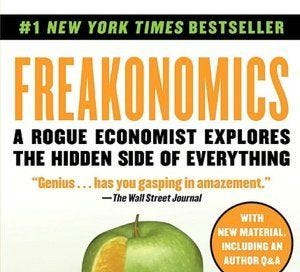Freakonomics by Steven D. Levitt and Stephen J.Dubner
Consider the following:
A gun or a swimming pool: which is more dangerous? What do school teachers have in common with sumo wrestlers? Why do drug traffickers continue to live at home with their mothers? Does 'parenting' really make a difference? Is it feasible that real estate agents have your best interests at heart?
Freakonomics is a roller coaster ride. Witty anecdotes and observations that make you wonder if the most plausible reasons for why people behave the way they do are really the right explanations. And why, on occasion, adopting the contrarian viewpoint may be the better decision.
Breakdown (Chapter-wise):
◾ Incentives: Cheating teachers and sumo wrestlers; would a social incentive be more effective than a pecuniary one? (A discussion of why stronger KPIs beyond test scores/grades should be used to assess learning.)
◾ Information asymmetry: How real estate agents, the Ku Klux Klan (a white supremacist African American hate group), and other experts exploit it.
◾ Wage disparity: In corporations and narcotics trafficking organizations, by promoting the notion that "one day you'll be the top boss." I'm intrigued as to where else we've heard that. Hmm.
◾Far-reaching implications of legal pronouncements: In the United States, legal abortion resulted in a fall in crime rates. (At first, it was disputed, but the duo later clarified it.
◾ Whether or not parenting has an impact on a child's financial situation. Their names, too.
Wall Street Journal describes it as, “If Indiana Jones were an economist, he’d be Steven Levitt… Criticizing Freakonomics would be like criticizing a hot fudge sundae.”
Here are some additional resources as well if you wanna know what the book is like:
Blog and Radio Podcast: freakonomics.com
Documentary: Amazonprime



